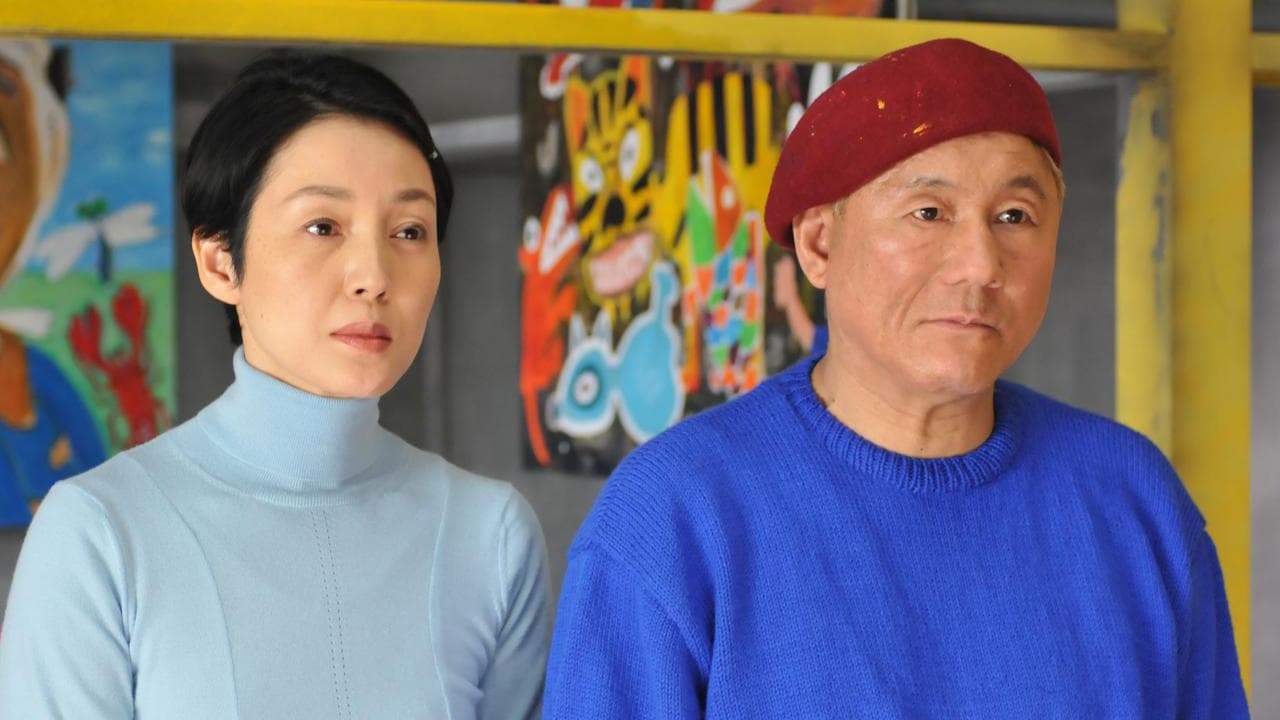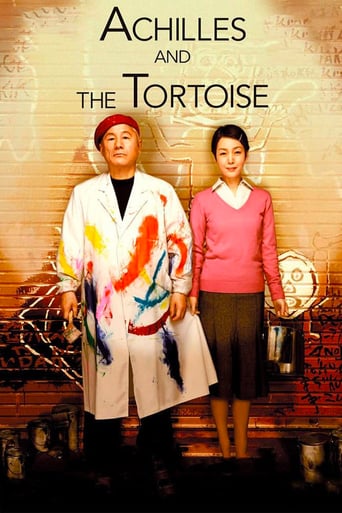

The movie does not work in only one level; so it can be seen as a sampling of art, in this case: "painting"; from different viewpoints or dimensions. Good actors, humor Kitano style, the Japanese twisted style; however it is a mixture of 2 or 3 movies in one; changes radically from one part to another (the movie is not formally divided) and the only connection seems the art itself (that s not bad at all...) The first half has a coherent development of the script, good photography and shows us the protagonist as a school kid then as a young man. He, an almost autistic person that seems unaffected by the (good and bad) things that happen in his life. Perhaps the answer to why he continues to fail in his work. Failure to get emotionally involved in a way o another in such episodes or not take part physically or to be mentally affected by them, makes an artist that will not acquire the necessary skills (after assimilate and process its) to then translate them into his work; normally a way to say things or feelings of what a person (an artist) can not say in another way. We see a person who may have a natural talent for painting, or based on to paint and repetition developed good capabilities but do not know how to let out his own creative streak, which just ends up imitating the great painters or following great schools of painting in an evident level.-in a second part of the movie, changes completely and we see Kitano, fulfilling the lead role and with his rough style and Yakuza pose, this main character loses all silence and dedicating autism demanding constantly to his suffered side kick wife; dragging them in a not so good life. In this part the artist is showed like an "art junkie" There s kind of humor here and the shots are more TV like ones. The movie could be better or could be at least two movies...
... View MoreA small boy seems to have a wonderful gift for painting, and that's what he's doing all day long, painting. As his father is very rich everybody is encouraging the boy. The father bankrupts and commits suicide, followed by the mother, the boy remains alone and he continues painting, against all odds. And painting is what he'll do for all his life, against all odds, sacrificing everything, his life, his self-respect and the respect of the others, his family, everything, never getting public recognition.A story that's tragic, while put before us with a mix of surrealism and black humor. Behind the story there are autobiographical elements. It comes in the life of director Takeshi Kitano after a long artistic career, during which he tried different ways.I've read about it that's the third movie in a louse trilogy, dealing with the condition of the artist. I didn't watch the other movies, so I'll speak only about this one.The title sends to the well-known paradox of Zeno: Achilles can never catch the tortoise though the distance between them gets smaller and smaller. Here in the movie it is the artist playing Achilles, while the tortoise is the never reached public recognition.It is a movie about art and artists, about their place, their value, their meaning. A movie that is itself an exquisite artwork, a lesson of modern art. As I was watching it each image was cutting my breath.Exquisite and disturbing, and as autobiographical suggestions are loosely implied, this movie might be, to a certain extent, a form of exorcism. A beautiful movie putting bluntly brutal questions. Is art necessary? Is it moral to be an artist? Is the artist just a mentally disturbed guy, a deviant? And, when becomes an artwork truly unique? This movie does not give simple solutions, actually it shows how complicated are the answers. The name of Turkish writer Elif Shafak comes here in my mind, she was saying in an interview that art (in this case this movie) should not come with quick fixes, rather it should look for all nuances, making matters more complicated.
... View MoreI like different films especially from Japan and this fits the category, interesting from beginning to end, a sad film in my opinion but with lots of messages for art lovers if you look that deep into the story, a bit like Rembrandts 'Nightwatching'.Didn't quite get the ending but it didn't seem to matter. Gosh to have a wife like he had, so patient and supportive all his life but sad for the daughter who had to endure so much also all her life.The title is a stunning one. Okay the Tortoise is the pursuit of success but what is the Achilles, the inability over time to achieve that success? Good acting throughout but cant take it as a comedy with a western mind.
... View More"Achilles" is the last of the Kitano's trilogy about the joys and woes of a creative artist. I have watched the second, "Glory to the filmmaker" (2007) but not the first, "Takeshis" (2005). "Glory" was a little disappointing, mainly because it was unfocused, seeming to wander and meander without s clear course. "Achilles" is anything but unfocused.While this movie is generally labelled a comedy, the first half comes off like a Dickensian tale of an orphan. Coming from a well-off family, little Machisu finds himself plunged through a series of misfortunes – the family financial disaster, suicide of father, and then mother, an existence of drudgery under an unsympathetic uncle, then the orphanage, and finally making a living at a lowly position. The tale is told, however, with little poignancy. One reason is that the misery our protagonist goes through is nowhere near an average Dickensian orphan's. He has schooling, a kindly aunt and a very reasonable employer, just to name a few blessings. But the most important factor is Machisu himself.The taciturn child has a singular passion for painting to the extent that he at times almost seem autistic, although he is in fact not. But painting is such a consuming passion that nothing else counts. This is portrayed with remarkable consistency by the three actors from early childhood to young manhood, when he marries an insanely (just a manner of speaking) supporting girl who not only understands, but also embraces his addiction for painting. At this point, the comedy takes over, mainly generated by Machisu and his cohorts in their various imaginative attempts at creative painting. Hilarity ensues, but also some lethal consequences, literally. There is black comedy, but comedy nonetheless.In comes Kitano, playing Machisu at middle age (and wife played by Kanako Higuchi, whose heart-wrenching performance in "Memories of tomorrow" I still remember) with a daughter in late teens. Those who are familiar with Kitano's work will appreciate how well this character fits with his best-known screen persona – the expressionless face this is full of expressions, if you know what I mean. By this time his passion has gone completely out of control, and all hell breaks loose. I shall not, of course, disclose the ending. Better than "Glory", this is not Kitano's best. Still, it has all the good old Kitano ingredients such weird humour and underplayed characters. The profusion of colour scheme (often, but not always, through the paintings themselves) reminds me of "Dolls" (2002) which he directed but did not act in. On the title, the paradox of Achilles and the tortoise, often used as an introduction to calculus, is adopted here to depict Machisu's perpetual pursuit of the elusive art of painting.
... View More